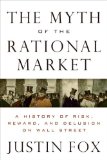 Roger Lowenstein’s work has been discussed in some detail on The Rational Walk over the past few months. Lowenstein is the author of Buffett: The Making of an American Capitalist which was reviewed last month. More recently, he wrote While America Aged which covers several case studies related to the pension crisis in the United States (this book was reviewed in February). Given Lowenstein’s background, I was interested to read his review this morning in The Washington Post of an upcoming book by Justin Fox covering the unavoidable implications recent history has on various theories of “market efficiency”.
Roger Lowenstein’s work has been discussed in some detail on The Rational Walk over the past few months. Lowenstein is the author of Buffett: The Making of an American Capitalist which was reviewed last month. More recently, he wrote While America Aged which covers several case studies related to the pension crisis in the United States (this book was reviewed in February). Given Lowenstein’s background, I was interested to read his review this morning in The Washington Post of an upcoming book by Justin Fox covering the unavoidable implications recent history has on various theories of “market efficiency”.
A Stake Through the Heart of the Theory
If the 1987 stock market crash and the dot com boom earlier this decade were not enough to destroy the efficient market theory once and for all, Lowenstein believes that the current recession may finally do the job:
The upside of the current Great Recession is that it could drive a stake through the heart of the academic nostrum known as the efficient-market hypothesis. This theory holds that stock and bond markets are nearly perfect — even during such crazes as the dot-com mania — and that prices on the exchanges instantly and accurately reflect the available information about publicly traded securities.
The Power of the Doctrine
The power of the doctrine was its grand design: the comforting notion that the financial universe adhered to absolute laws. But that was also its flaw. Prices couldn’t be wrong; if they were, someone would seek to profit from the error and correct it. The illustrative joke was of two economists who spot a $10 bill on the ground. One stoops to pick it up, whereupon the other interjects, “Don’t. If it were really $10, it wouldn’t be there anymore.”
Fox’s Contribution
Fox, a business columnist for Time, spins a fascinating historical narrative, beginning with economist Irving Fisher’s paean to markets in, alas, 1929. Postwar economists such as Paul Samuelson noticed that most investment pros do not beat the averages. This led to the one positive contribution of the efficient-market hypothesis: Jack Bogle’s invention of index funds, which mimic the performance of the stock market as a whole and keep ordinary people from wasting their money trying to beat it. (Editor’s Note: For a recent set of video interviews of Bogle, click here.)
Fox recognizes that true believers in the market’s efficiency suffered from a “blinkered” mindset and “tunnel vision.” Yet I think he lets them off too easily. He laments (as if it were necessary) the lack of any alternative “grand new theory” and finds that the debate has resulted in a “muddle.” Fox concludes, “If you do come up with an idea for beating the market, you need a model that explains why everybody else isn’t already doing the same thing.” Not necessarily. Markets aren’t physics. Maybe no one model explains them.
For Lowenstein’s full review, be sure to visit The Washington Post website. I am planning to read Fox’s new book and post some of my comments once some reasonable progress is made on my existing pile of unread books.
